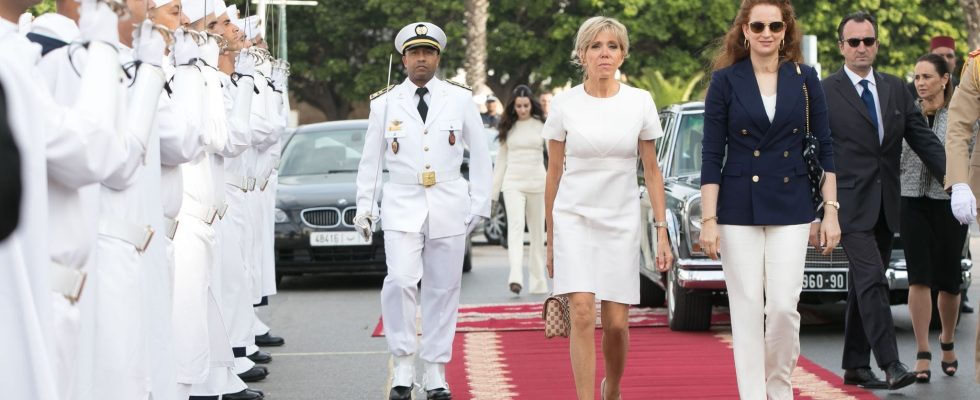Nothing like an invitation to the Elysée to strengthen ties. This Monday, February 19, the wife of the Head of State, Brigitte Macron, welcomed the sisters of the King of Morocco, Mohammed VI. The result was a photo, published on Instagram by the French presidency, displaying four women with shy smiles.
“In continuation of the historic friendly relations between France and the Kingdom of Morocco, Madame Brigitte Macron received Their Royal Highnesses Princesses Lalla Meryem, Lalla Asmaa and Lalla Hasnaa”, we can read in the caption. Although absent from the photo, “President Emmanuel Macron came to greet them” on this occasion, specifies the official account of the Elysée, adding that the head of state “recently spoke with His Majesty Mohammed VI” .
Behind this photo hides the ambition of France which, in recent months, has displayed its desire to renew a bond of trust with Morocco. In a daily interview West Francethe newly appointed Minister of Foreign Affairs, Stéphane Séjourné, assured that the presidency had “asked him to [s]”invest personally in the Franco-Moroccan relationship and also write a new chapter in our relationship.”
A vast project, given the tensions and the crisis which marked Franco-Moroccan relations in 2023. “There were misunderstandings which led to a difficulty”, adds the young minister, appointed last January. And Stéphane Séjourné knows the details of this “difficulty”.
Rising tensions
When the latter chaired the Renew Europe group, the European Parliament voted, in January 2023, a resolution condemning the deterioration of press freedom in Morocco. A decision which deeply irritated Rabat, and one of the main instigators of which was none other than… the current Minister of Foreign Affairs.
Especially since there are numerous precedents between the two countries. It all started in 2014, with the indictment for acts of torture of Abdellatif Hammouchi, the head of Moroccan intelligence, close to the king. This was followed by the Pegasus scandal in 2019, when Morocco used Israeli spyware to wiretap French journalists and politicians – including Emmanuel Macron.
Another reason for discontent: the policy of rapprochement with Algeria, initiated by Emmanuel Macron, while Algiers broke off diplomatic relations with Rabat in 2021. The peak of the crisis was reached during the earthquake of September 8, 2023, which had left nearly 3,000 dead and 6,000 injured. To this date, Morocco has not responded to France’s aid proposals.
An “essential” relationship
Paradoxically, it was shortly after this episode, which reduced some 60,000 homes to ruins, that the diplomatic machine restarted. At the end of September, Christophe Lecourtier, until then persona non grata in the kingdom, was finally able to hand over his credentials to King Mohamed VI.
At the end of October, the kingdom finally agreed to appoint an ambassador to Paris – a position vacant for almost a year. This is Samira Sitaïl, a former journalist converted into an expert communicator in crisis situations.
But the thaw in relations between the two states is only just beginning. There remains the thorny issue of Western Sahara, this great desert in the south of Morocco that the country considers its territory. However, he faces the independence ambitions of the Polisario Front, his sworn enemy.
If France has never opposed de facto to Morocco’s claims on the issue, it has not sought to become directly involved in the conflict either. At least, until the appointment of Stéphane Séjourné. The latter seems to be putting forward a diplomatic and pro-Moroccan path, while claiming to want to “regain the confidence of Morocco” in the columns of West France.
“In the past, we have always been there, even on the most sensitive issues such as Western Sahara, where France’s clear and constant support for the Moroccan autonomy plan has been a reality since 2007,” insists the head of the Quai d’Orsay. The latter also assures that he has “resumed the link with Morocco” – a relationship that he describes as “essential”… and fragile.
